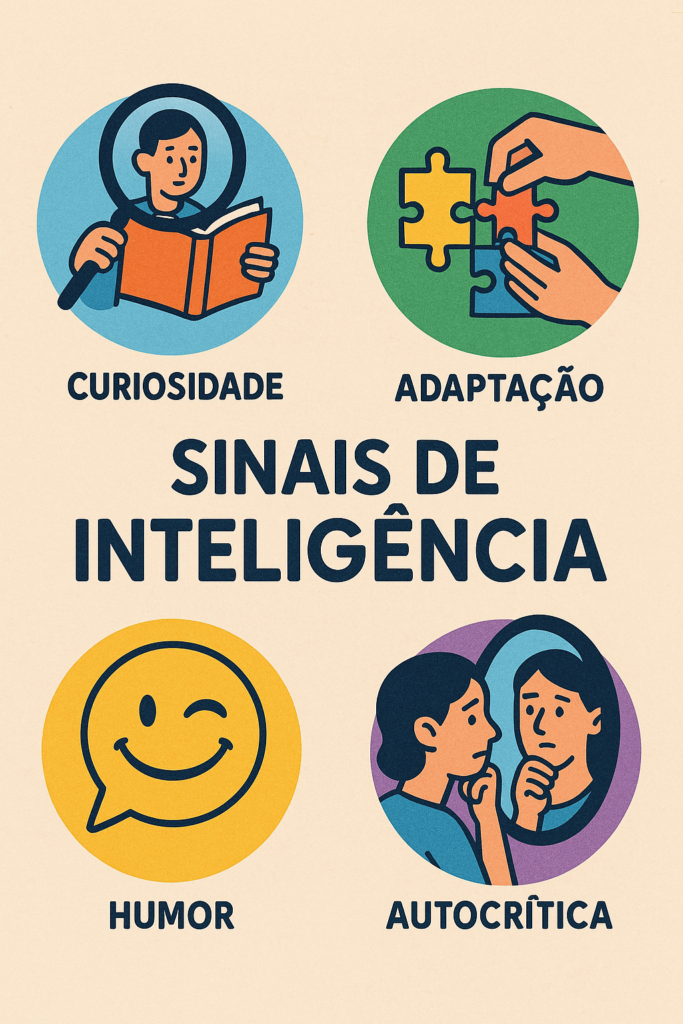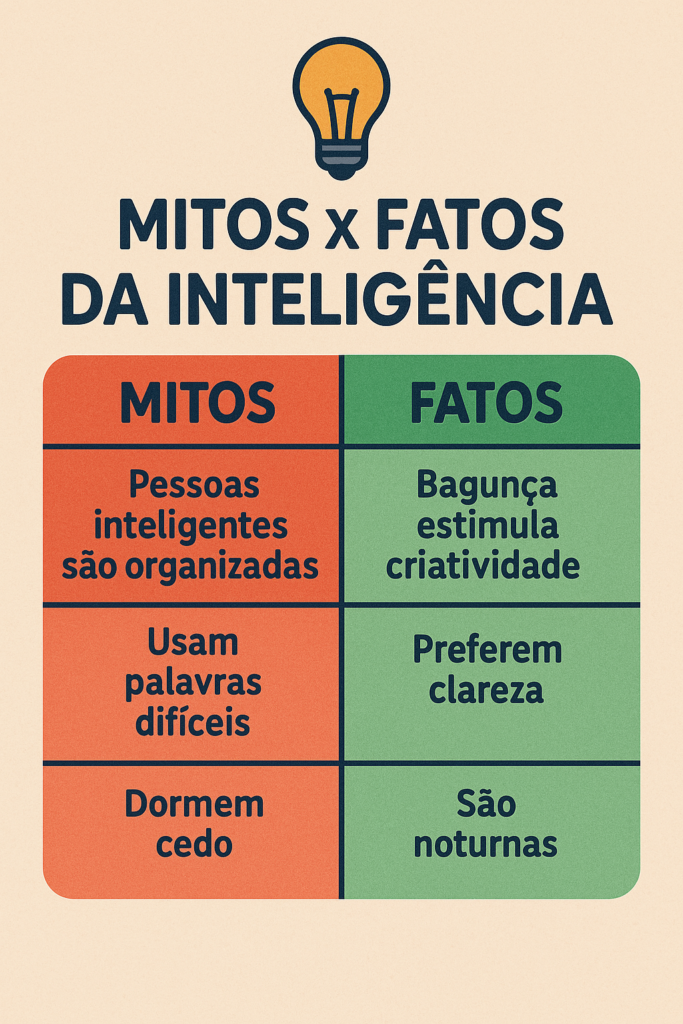Have you ever wondered how to spot an intelligent person? Maybe you pictured someone with big glasses, solving impossible equations or reciting poems by heart.
But the truth is that intelligence is not that obvious – and, according to psychology, it could be right next to you, hidden in simple gestures or habits that you don't even notice.
In this article, we’ll dive into what science says about this, bringing you studies, facts, and even some stories that will make you look at the people around you differently.
It's not just about IQ or high grades; it's about understanding what makes a mind shine, whether in the classroom, at work, or in a casual conversation at the café.
So, grab a cup of tea (or coffee, if you’re a night owl like me) and come discover how to recognize intelligence in a new, human way!
What is Intelligence according to psychology?
Before you go out there trying to identify an intelligent person, it's worth stopping and thinking: what is intelligence, after all?
I myself have caught myself imagining that it was just a matter of being good at math or having an elephant's memory. But psychology has shown me that it is much more than that – and, look, it is fascinating!
For a long time, the Intelligence Score (IQ) was the king of measurements.
Created in the early 20th century by Alfred Binet, it assesses things like logical reasoning, memory and mental speed.
If you've ever taken one of these tests, you know it's quite a challenge.
But does it tell the whole story? Not at all. In 1983, Howard Gardner, an American psychologist, turned this game around with the theory of Multiple Intelligences.
He said something that changed everything: there is more than one intelligence.
I know someone who isn't a big fan of tests, but can fix anything at home with a brilliant hack – that's pure practical intelligence!
These ideas show that intelligence is a mosaic, full of colors and shapes.
You can't put everyone in one box. And the coolest thing? It appears in everyday life, in things that we don't always value. Let's see how?
Signs of an Intelligent Person in Everyday Life
Now that we know that intelligence isn't just about tests, how does it appear in real life?
I've found myself observing the people around me—on the bus, at work, in line at the grocery store—and trying to guess who has that special spark.
Psychology provides some incredible clues to this, and I'm going to tell you some that surprised me.
Never ending curiosity
You know that person who is always asking “why?” or who searches everything on Google just for the fun of it? A 2016 study in Journal of Individual Differences showed that people with high intelligence tend to be like this: curious, open to new ideas. My cousin, for example, is one of those. The other day, she called me to tell me that she spent the night reading about volcanoes just because she saw a documentary. That's intelligence in action!
Turn around in 30
Robert Sternberg once said that practical intelligence is about adapting. Think about that colleague who, when the boss throws a new problem on the table, doesn't panic – he takes a deep breath and finds a way. I saw this in practice with a friend who organized a last-minute barbecue with half a dozen things he had in the fridge. The result? Everyone praised him!
Humor that makes you think
Who would have thought that laughing at a good joke is a sign of intelligence? A 2017 survey in Cognitive Processing showed that those who enjoy dark humor or sarcasm usually have sharp verbal intelligence and creativity to spare. My brother is a master at this – he makes an ironic comment that makes me laugh and think at the same time.
You know you don't know everything
The Dunning-Kruger Effect, from 1999, is a classic. It says that smart people recognize how much they still have to learn, while those who aren’t so smart think they already know everything. Have you ever noticed how the best teachers are the ones who say, “I’ll check that for you” instead of making up an answer?
These signs are like hidden clues. The other day, in a group of friends, I noticed that the quietest person in the group was the one asking the most interesting questions. Intelligence doesn't need to shout to be noticed.
Signs of Intelligence in Everyday Life

These signs are a start, but psychology has more surprises up its sleeve. Let’s explore some characteristics that are out of the ordinary?
Studies that Reveal Unexpected Characteristics
Intelligence does not follow a movie script.
Sometimes it appears where we least expect it – and studies prove this with stories that seem like something from another world. I'll tell you some that made me rethink a lot of things.
- The night class: Are you the type of person who performs best when the sun goes down? A 2014 study in Personality and Individual Differences discovered that intelligent people are often nocturnal. They like the calm of the early morning to think, create or just be with their own thoughts. I'm like that – I've already written the best ideas for this article at 2 am, with a cup of tea by my side. Do you also have this owl side?
- Inspiring mess: You know that desk full of papers that your mother is always complaining about? Well, it could be a sign of intelligence! A study by the University of Minnesota in 2013 showed that disorganized environments stimulate creativity. My artist friend swears that she can only paint in the middle of chaos – and her paintings are incredible.
- Plain speech, sharp mind: Some people think that intelligence is using difficult words to impress. But a 2016 study in Applied Cognitive Psychology showed the opposite: intelligent people explain complex things in a way that everyone understands. My grandfather was like that – he would tell stories about quantum physics as if it were a fishing tale, and I would leave thinking I understood the universe.
These discoveries have made me look at people differently. The other day, I saw a coworker with a messy desk and thought, “Could he be a genius in disguise?” Science says it’s possible!
Myths vs. Facts About Intelligence

These studies are an invitation to take a closer look. But how can we put this into practice in our daily lives? Let's see!
How to Identify an Intelligent Person in Practice
It's time to get your hands dirty – or rather, your eyes on real life. Identifying an intelligent person doesn't require a test or a diploma on the wall.
It's about noticing the little things, and I'm going to give you some tips that I've learned from observing people around.
- The power of listening: Intelligent people don’t talk all the time. They listen, pay attention, and only open their mouths when they have something to say. Have you ever noticed that friend who stays quiet during a discussion, but when he speaks, everyone stops to listen? At the last family gathering, my aunt did this – she let everyone talk and, in the end, she came up with a solution so simple that no one had thought of it.
- Solving problems like breathing: They don’t freak out when faced with unexpected situations. On the contrary, they face the challenge calmly and find a way. My neighbor is like that – when his car broke down in the middle of the street, he improvised a repair with duct tape and a piece of wire. It worked until he got to the garage! That’s practical intelligence, as Sternberg used to say.
- Humility that surprises: Remember the Dunning-Kruger Effect? Smart people don’t think they’re the ones who know the truth. They say “I don’t know” and then go after the answer. My boss is an example – with years of experience, he still asks his team for their opinions and thanks them when he learns something new.
Golden tip: Pay attention to those who resolve conflicts without drama or learn from their own mistakes. The other day, I saw a woman at the grocery store help an elderly man choose fruit just because she noticed he was confused. No fuss, just kindness and emotional intelligence.
These tips are simple, but they change the way you see the world. Let's end on a high note, shall we?
Conclusion
Identifying an intelligent person is almost like hunting for hidden treasure – it’s not on the surface, but in the details.
Psychology shows us that it's not just about IQ or degrees, but about curiosity, adaptation, a clever sense of humor, and even creative messiness.
Studies reveal that these brilliant minds can be nocturnal, speak plainly and admit that they don't know everything.
And the best part? You can find these signs anywhere – in your coworker, your quiet friend, or even in yourself.
So, how about looking around you with more affection?
Observe who truly listens, who solves problems with a smile, or who asks more questions than answers. Perhaps intelligence is closer than you think.
And if you want, tell me in the comments: what signs have you seen out there? Keep exploring this incredible topic – it has a lot to teach us about people and about ourselves!
I'm the curious mind behind acuriosa.net! I love discovering fascinating stories, traveling through the world of new things and sharing it all with you in a light and engaging way. Let's explore the most incredible and surprising curiosities out there together?
